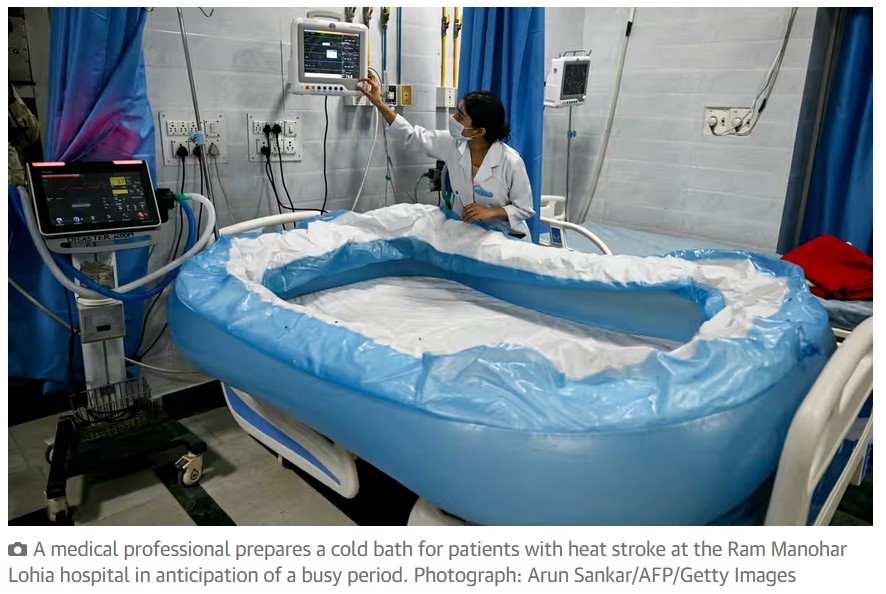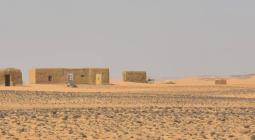‘Unliveable’: Delhi’s residents struggle to cope in record-breaking heat

As the water tanker drove into a crowded Delhi neighbourhood, a ruckus erupted. Dozens of residents ran frantically behind it, brandishing buckets, bottles and hoses, and jumped on top of it to get even a drip of what was stored inside. Temperatures that day had soared to 49C (120F), the hottest day on record – and in many places across India’s vast capital, home to more than 29 million people, water had run out.
Every morning, Tripti, a social health worker who lives in the impoverished enclave of Vivekanand Camp, is among those who has to stand under the blazing sun with buckets and pots, waiting desperately for the water tanker to arrive.
“People have to wait for two to three hours in the queue for just for the couple of buckets of water,” she said. “The increasing temperature has made it worse. As the heat is increasing, we need more water but the supply is in fact decreasing. We are suffering badly and heat is making it impossible to live.”
Delhi is no stranger to heat. Its summers always bring stiflingly hot temperatures and the rich confine themselves to their air-conditioned homes, while poor households gather beneath fans and cover themselves with wet rags.
The consensus among experts and residents is that the summer temperatures are now regularly rising far above the norm as India bears the brunt of the climate crisis. A heatwave has enveloped much of north India in May – this week temperatures consecutively rose above 45C – making conditions unbearable and even life threatening for the millions who cannot afford to cool themselves down or are forced to work outside in construction or labouring jobs. Some parts of the city recorded temperatures as high as 52C on Wednesday, though officials later said that may have been a faulty reading.
Chronic water shortages have blighted the city over the past few days as the authorities were unable to meet rising demand, causing mass suffering among poor people, who often have no way to cool down other than by dousing themselves in water or using it in air coolers. The Delhi government said it had set up a heatwave “war room” that would dispatch water tankers to wherever they were needed.
Conditions have been worsened by lengthy power cuts across the capital after millions began running air conditioners, pushing electricity demand to an all-time high. Nitin Singh, 45, a lawyer who resides in the Lajpat Nagar neighbourhood, described the devastating impact of the daily power outages in a home he shares with his young children and an ailing 81-year-old father. Since the heatwave had hit, he said, Delhi had become “unliveable”.
“My home has three air conditioners, but frequent power outages have left me helpless,” said Singh. “A two-hour power outage last night compelled me to reserve a hotel room for my sick father and kids. My wife and I spent the majority of the night on our home’s terrace, and we had trouble falling asleep even for a few hours.”

Mohammad Ashraf Khan, 37, who runs an air conditioner rental shop in the Okhla area, said that since temperatures went above 45C his phone had been buzzing off the hook. He usually rents out 80 air conditioners every season, but this year the demand increased to 130.
“There have been more and more complaints this year about overheating and malfunctioning air conditioners,” he said. “This awful heat makes even the standard air conditioners insufficient.”
Yet air conditioners are still largely a luxury commodity. Among those who did not survive the extreme conditions was a 40-year-old migrant labourer who worked in a factory in Delhi. He died on Wednesday after his body temperature rose 5C higher than normal. “He was living in a room with no cooler or fan and developed a very high fever … his body temperature shot up above 107F [41.5C],” his doctor told Indian media.
Some wealthier residents have been doing what they can to help those unable to get respite. In a south Delhi neighbourhood, Nisha Aggarwal always observes an old tradition of placing big clay pots filled with water on the pavement outside her house to allow passersby to slake their thirst. Most summers, her security guard refills the pots once a day but “it’s been so hot the past fortnight he’s been refilling them several times a day”, she said.
Probir Ram, a security guard, was among those forced to sit beneath the baking sun in order to make his day’s wages. His request for a water cooler in his stiflingly hot cabin was refused by his employer. Bathed in sweat, his shirt drenched, Ram looked miserable. “I’m convinced this heat will continue,” he said with a sigh. “People like me won’t be able to cope. We’ll just die earlier. What else?”
Amrit Dhillon and Aakash Hassan contributed reporting






